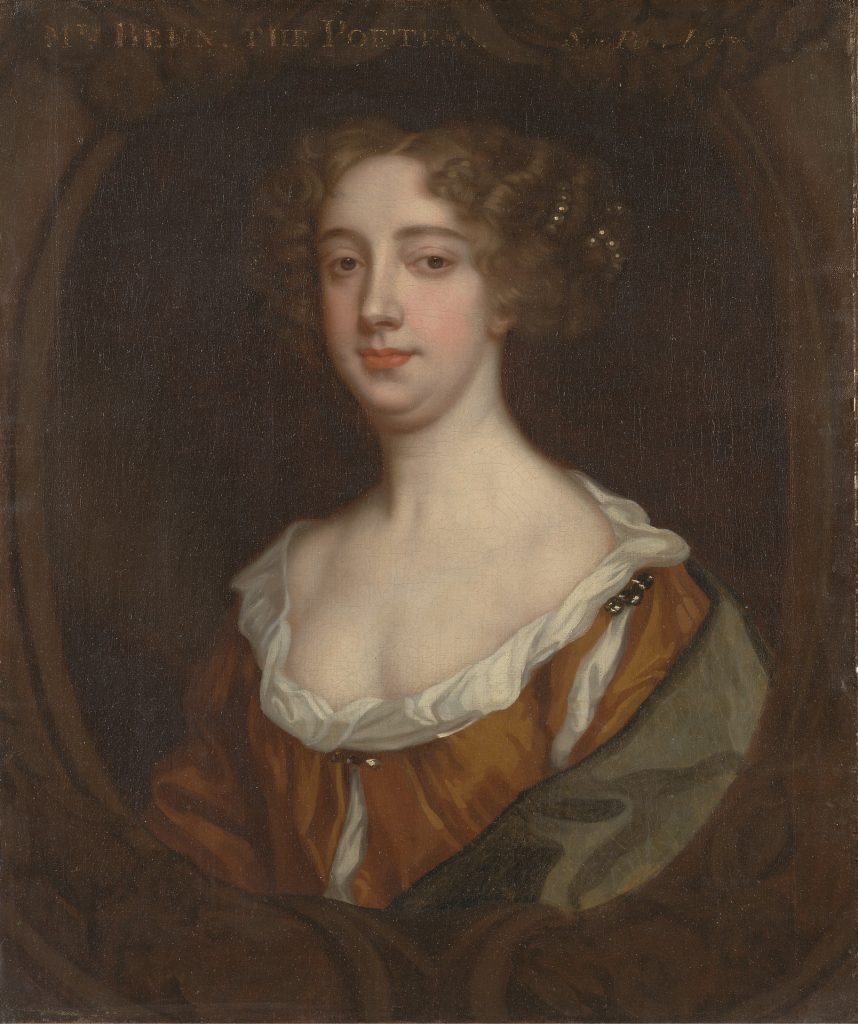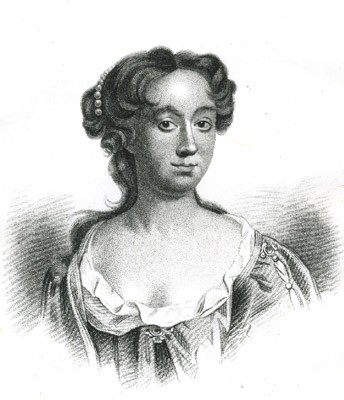Born in 1640, Aphra Behn was one of the first women in England to make a career out of writing. As a playwright, poet, translator, and Restoration era author, she became a literary role model for women born in the upcoming generations. Behn was first a spy for King Charles II in Antwerp until she returned to London and began playwriting under the name Astrea. Behn died in 1689 at the age of 48.
There is not much known about Aphra Behn’s early life. In fact, it is unknown who her parents were. It has been said she was born to a barber, John Amis, and his wife, Amy. Other stories recount her being born to a couple with the surname of Cooper. Yet, in The Histories And Novels of the Late Ingenious Mrs. Behn it is said that her father, a barber, was named Bartholomew Johnson and her mother, a wet-nurse, was Elizabeth Denham. The only person who claimed to have known Behn as a child was Colonel Thomas Colepeper. According to him, she was born to a man with the surname of Johnson near Canterbury and that she also had a sister. Anne Finch has said that Behn was born to a barber in Wye, Kent. Whichever, if any, of these sources are true, it is thought that Behn most likely purposely covered up her early life and origins. Even her birthday is not clear, though it is thought to be in 1640, sometime around December.
There is no real evidence of this, but it is also thought to be true that Behn was traveling to Suriname with Bartholomew Johnson as a young girl. Johnson supposedly passed away during the trip and his wife and children spent some time in Suriname before returning to England. Behn said she met an African slave leader while she was in Africa. He was the inspiration for her most notable work, a short story called Oroonoko about an African prince tricked into slavery. Again, it is unclear, but she may have even worked as a spy during her time in the colony, but there isn’t enough evidence to confirm one story true. Throughout her life, Behn was known by many names: Ann Behn, Mrs. Bean, agent 160, and Astrea. Also, there have been no church or tax records found with her name, another item worthy of note.
In 1664, she supposedly returned from Suriname to England. She most likely married a German or Dutch merchant named Johan Behn. Either Johan Behn passed away, or they separated in 1664. Aphra continued to use the surname Behn for her works and professional life though.
Behn had once commented that she was “designed for a nun,”, possibly hinting to having a Catholic upbringing. Many of her connections were with other English Catholics, like the English author Henry Neville who was imprisoned for his religion. She was also a monarchist, supporting the Stuart dynasty. It is also notable that she seemed to sympathize most with the Duke of York, who was also Catholic. Behn was also supportive of the restoration of King Charles II. At the same time, political parties were first beginning to appear in England. Behn found herself becoming a Tory supporter.
Most likely under influence from Thomas Culpeper, among others, Behn became attached to court two years after her supposed return in 1666. The previous year, war between England and the Netherlands broke out, making for The Second Anglo-Dutch War. On behalf of King Charles II, perhaps with help from courtier Thomas Killigrew, Behn was recruited in Antwerp, Belgium as a political spy. Behn’s time as a spy is the first well-documented period in her life, a contrast to her earlier life of which most was a mystery. She went by the code name of Astrea, which she also used after her return to London when she took up writing. Behn’s main goal was to form a relationship with Thomas Scot, an English politician executed as one of King Charles I’s regicides, son William Scot. It is believed that the younger Scot was planning to become an English spy to report the actions of those exiled from the country and were plotting against the king. While fire and plague wreaked havoc in London in July of 1666, Behn arrived in Bruges, Belgium. Her job was to turn Scot into a double agent. However, evidence suggests that Scot ended up turning Behn into the Dutch.
In Belgium, Behn was shocked by and unprepared for the cost of living. Only a month after she arrived, she tried to sell her jewelry for money, as her job as a spy did not pay well. The king slowly paid her, though he may not have even given her any money, for expenses and travel. For a year she petitioned King Charles for payment, but her attempts were unsuccessful. To return home to London, Behn had to borrow money. Though a warrant for her arrest was also issued, there is no evidence of her going to prison because of unpaid debts.
Because Behn was heavy in unpaid debts, she began working as scribes for both the King’s Company and the Duke’s Company. Up until this point, it was also clear that she had been writing poetry. Oliver Cromwell had previously closed theaters, but Charles II began to reopen them. The Forc’d Marriage, Behn’s first play, began to be staged in 1670. The following year, her play The Amorous Prince was as well. Behn wrote a third play called The Dutch Lover, but it ultimately failed. For three years, it is noticed that Behn had fallen off any public record when her play failed. Perhaps it was because Behn had spent her time traveling, possibly even as a spy. Afterwards, Behn began writing more comical pieces that turned out to be much more successful. Some of her most popular works were The Rover, which premiered in March of 1677, and Love Letters Between a Nobleman and His Sister, a novel published in three volumes in 1684, 1685, and 1687.
As she began to write more and her works were only growing more popular, Behn formed many friendships with fellow authors. Some of these included Elizabeth Barry, John Dryden, John Hoyle, Thomas Otway, and Edward Ravenscroft. Behn was also acknowledged as a member of the Earl of Rochester’s circle. As a member of the Tory political party, Behn also used her writings to attack Whigs in parliament.
Only a year before her death, A Discovery of New Worlds, a translation of a French astronomy book, Entretiens sur la pluralité des mondes, was published in 1688. Behn wrote it in a similar form to her own novels, but with a religiously oriented preface.
Throughout her life, Aphra Behn wrote nineteen total stage plays, becoming one of the first British prolific female playwrights. Falling just behind Poet Laureate John Dryden, she was one of the most productive playwrights in the 1670s and 1680s. She wrote four novels, five short stories, and two collections of poetry as well.
Behn’s health began failing in the four years leading up to her death, as she was constantly in debt and lived in poverty. She did not give up writing, despite the fact it was only more and more hard for her to even hold a pen. Shortly before her passing, she finished a translation of the final book in Abraham Cowley’s Six Books of Planets. On April 16, 1689, forty-eight year old Aphra Behn died. She was buried in the East Cloister of Westminster Abbey. Many people mocked Behn because she wrote bawdy works in masculine styles, but many also praised her. Other notable authors of her time celebrated her.



